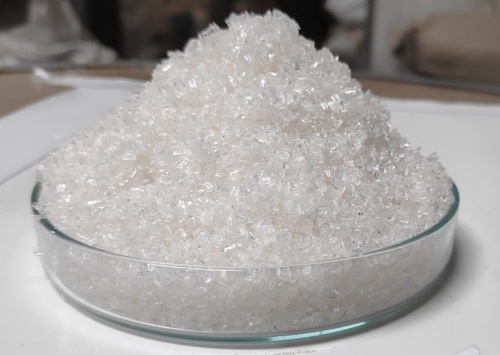Potassium Sulphate
1000 INR/Kilograms
Product Details:
- Appearance White
- Molecular Formula K2SO4
- Taste Bitter
- Physical Form Powder
- Melting Point 1,067 degrees Celsius
- Click to View more
X
Potassium Sulphate Price And Quantity
- 1000 INR/Kilograms
- 20000 Kilograms
Potassium Sulphate Product Specifications
- White
- K2SO4
- Bitter
- 1,067 degrees Celsius
- Powder
Potassium Sulphate Trade Information
- 10000 Kilograms Per Day
- 1 Week
Product Description
Potassium Sulphate, often abbreviated as K2SO4, is a chemical compound that contains potassium, sulfur, and oxygen. It is commonly used in various industrial applications, agriculture, and in laboratory settings. Here are some key points about Potassium Sulphate:
Potassium Sulphate Properties:
1. Chemical Formula: The chemical formula for Potassium Sulphate is K2SO4, indicating that it contains two potassium ions (K+) and one sulfate ion (SO42-).
2. Physical State: Potassium Sulphate typically exists as a white crystalline solid. It can also occur in other forms such as granules or powder, depending on its intended use.
3. Solubility: It is soluble in water, meaning it can dissolve in water to form a clear solution. The solubility of Potassium Sulphate increases with temperature, but it is generally less soluble than potassium chloride.
4. Melting Point: The melting point of Potassium Sulphate is approximately 1,067 degrees Celsius (1,953 degrees Fahrenheit). At this temperature, it undergoes a phase change from a solid to a liquid.
5. Density: The density of Potassium Sulphate varies depending on its form (e.g., powder, granules, or crystals) and any impurities present. Generally, its density ranges from about 2.66 to 2.78 grams per cubic centimeter (g/cm3).
6. Odor and Taste: Potassium Sulphate is odorless and has a bitter, salty taste.
7. Hygroscopicity: It has hygroscopic properties, meaning it can absorb moisture from the air. This property can lead to clumping or caking of Potassium Sulphate over time if not stored properly.
8. Chemical Stability: Potassium Sulphate is stable under normal conditions, but it may decompose at very high temperatures.
9. Reactivity: It is relatively inert under most conditions and does not react violently with common materials. However, it can react with strong acids or bases to form other compounds.
10. pH: Aqueous solutions of Potassium Sulphate are neutral, with a pH close to 7.
Potassium Sulphate Applications:
1. Agriculture and Horticulture:
One of the primary uses of Potassium Sulphate is as a fertilizer. It provides essential potassium (K) and sulfur (S) nutrients to plants, promoting their growth, development, and overall health. Potassium is crucial for various plant functions, including photosynthesis, enzyme activation, and water regulation, while sulfur is essential for protein synthesis and overall plant metabolism. Potassium Sulphate is particularly beneficial for chloride-sensitive crops such as tobacco, fruits, vegetables, and certain tree crops.
2. Industrial Applications:
a. Glass Manufacturing: Potassium Sulphate is used as a fluxing agent in the production of glass. It helps to lower the melting point of silica (SiO2) and other ingredients, facilitating the glass-forming process.
b. Dyes and Pigments: It is employed in the production of dyes and pigments, where it serves as a source of potassium and sulfur in various formulations.
c. Chemical Manufacturing: Potassium Sulphate is used as a raw material in the synthesis of various chemicals, including potassium carbonate, potassium hydroxide, and alum.
3. Laboratory and Analytical Chemistry:
a. Reagent: Potassium Sulphate is utilized as a reagent in various laboratory procedures and analytical techniques.
b. Drying Agent: It is commonly employed as a desiccant or drying agent to remove moisture from organic solvents or gas streams in laboratory settings.
4. Electrolyte:
Potassium Sulphate is utilized as an electrolyte in certain types of batteries, particularly lead-acid batteries used in automotive and industrial applications.
5. Other Applications:
a. Medicine: In some cases, Potassium Sulphate may be used in pharmaceutical formulations for its potassium content.
b. Food Additives: While less common, Potassium Sulphate may be used as a food additive in certain products where potassium enrichment is desired.
Potassium Sulphate FAQ:
Q. What are the benefits of using Potassium Sulphate as a fertilizer?
Ans: Potassium Sulphate provides essential nutrients potassium and sulfur to plants, promoting healthy growth, improved crop yield, and stress tolerance. It is particularly beneficial for chloride-sensitive crops.
Q. How is Potassium Sulphate different from other potassium fertilizers like potassium chloride?
Ans: Unlike potassium chloride, Potassium Sulphate does not contain chloride ions, making it suitable for chloride-sensitive crops. It provides potassium and sulfur without increasing soil salinity.
Q. What crops benefit most from Potassium Sulphate?
Ans: Potassium Sulphate is beneficial for a wide range of crops, including fruits, vegetables, tobacco, tree crops, and other chloride-sensitive plants. It can enhance the quality and yield of crops such as grapes, citrus fruits, potatoes, and tomatoes.
Q. How is Potassium Sulphate applied in agriculture?
Ans: Potassium Sulphate can be applied to soil directly or dissolved in water for fertigation (irrigation with fertilizers). It is often incorporated into the soil before planting or applied as a top dressing during the growing season.
Q. Is Potassium Sulphate safe to use in agriculture?
Ans: Yes, Potassium Sulphate is generally considered safe when used according to recommended guidelines. However, like any fertilizer, it should be handled with care to prevent potential hazards. It is important to follow safety instructions provided by manufacturers.
Q. Can Potassium Sulphate be used in organic farming?
Ans: Yes, Potassium Sulphate is approved for use in organic farming according to many organic certification standards. It is considered a naturally occurring mineral source of potassium and sulfur.
Q. Are there any environmental concerns associated with Potassium Sulphate use?
Ans: When used responsibly and in appropriate quantities, Potassium Sulphate is not typically associated with significant environmental risks. However, excessive use may contribute to soil salinity or nutrient runoff, which can impact water quality.
Tell us about your requirement

Price:
Quantity
Select Unit
- 50
- 100
- 200
- 250
- 500
- 1000+
Additional detail
Mobile number
Email






 Send Inquiry
Send Inquiry Send SMS
Send SMS
